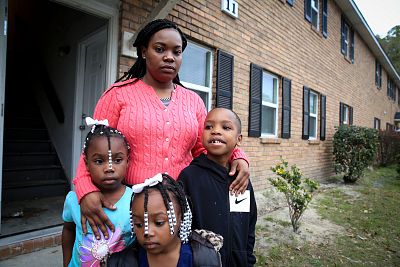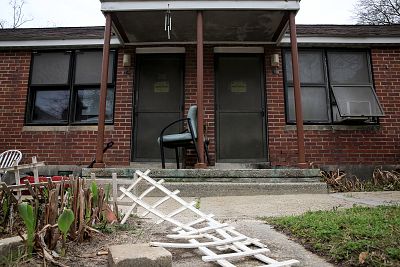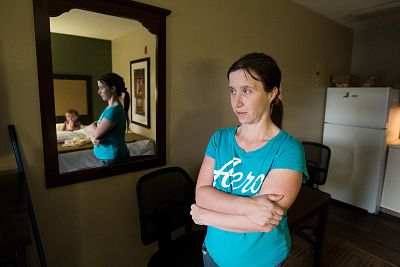At least 11 residents of federally subsidized housing have died of carbon monoxide poisoning since 2003, an NBC News investigation found.
WASHINGTON — Members of Congress are working on a legislative fix to reduce carbon monoxide hazards after an NBC News investigation revealed that detectors are not required in federally subsidized housing. Their efforts come as housing advocates demanded Monday that U.S. Housing and Urban Development Secretary Ben Carson take emergency measures to address the problem.
Rep. Cheri Bustos, D-Ill., a member of the House Appropriations Committee, which oversees funding for HUD, said she was disturbed by the federal housing agency's "clear negligence on this issue."
"The buck stops with them and with Secretary Carson," Bustos said. "Complacence is not an option when lives are on the line, and I hope HUD hears that message loud and clear."
NBC News found that at least 11 deaths in federally subsidized housing since 2003 were caused by carbon monoxide poisoning, most recently in January when two men died in a public housing complex in Columbia, South Carolina. HUD does not require carbon monoxide detectors in public housing and has been slow to combat the hazards posed by the gas, public health experts and housing advocates say.
"Children, families and elderly folks are clearly at risk — and I'm already looking into legislative and appropriations solutions with several of my colleagues," said Bustos, who criticized the federal agency for failing to protect residents in the South Carolina complex**.**
In a letter to Carson on Monday citing NBC News's findings, 15 housing and legal advocacy groups urged Carson to issue "emergency guidance" to require that carbon monoxide detectors be installed immediately in all HUD-subsidized units with gas-powered appliances, generators or attached garages. That would bring HUD in line with recommendations from the Centers for Disease Control and Prevention, as well as HUD's own guidancefor the general public.
"People are dying — it's an immediate issue," said Deborah Thrope, supervising attorney for the National Housing Law Project, a legal advocacy group, who co-authored the letter. "There's no reason for HUD to wait."
"Every moment HUD delays amending regulations to require carbon monoxide monitors, it is putting human life in danger," added Emily Benfer, a visiting associate clinical professor of law at Columbia University, who co-wrote the letter.
HUD responded that the issue is a top priority for the agency but did not offer a timeline or detail changes to inspection standards.
"HUD is looking very deeply into how to require local public housing authorities and private owners of taxpayer-supported housing to better protect their residents from carbon monoxide," said HUD spokesman Raffi Williams. "This issue ranks among this department's highest priorities as we work to improve the health and safety conditions of the housing that we support."
Williams added that Carson "whole-heartedly supports" the ongoing investigation by the HUD's Inspector General of the public housing complex in Columbia where two men died and more than 400 residents lost their homes in January because of dangerous living conditions.
Colorless, tasteless and odorless, carbon monoxide can build up inside a home because of faulty furnaces or poor ventilation and kill within minutes at high levels. Children and the elderly are particularly vulnerable to the harms of carbon monoxide, and they make up a disproportionate number of public housing residents.
But NBC News has found that requirements for detectors are spotty and incomplete across the U.S.: They are mandatory in only about half of states, and those states generally leave enforcement up to local governments that don't conduct regular inspections of public housing. Those inspections are conducted by HUD, which doesn't require detectors.
Members of Congress said they are prepared to press Carson on the threat to public housing residents the next time he appears on Capitol Hill.
Rep. David Price, D-N.C., chair of the House Appropriations subcommittee on transportation and housing, described NBC News' recent report as "horrifying" and said he expected the issue to come up during his committee's upcoming budget hearing with the HUD secretary, which could happen in early April.
Advocates say carbon monoxide should be a priority for HUD, especially given Carson's background as a doctor and repeated promises to fight health hazards in low-income communities.
In their letter to Carson, advocates also said HUD should create new rules that would classify the absence of a working carbon monoxide detector as a "life-threatening emergency" that would result in a property immediately failing its regular HUD health and safety inspection. The letter described such steps as "commonsense measures" to protect families.
Ruth Ann Norton, president and CEO of the Green & Healthy Homes Initiative, raised the issue with a senior HUD official following NBC News' investigation and has asked Carson for a personal meeting on the issue.
"He could solve it in one day," said Norton, who added the absence of HUD requirements for detectors is "incredibly unacceptable and results in immediate death."
Advocates called upon federal lawmakers to act if Carson's agency fails to address the problem.
"Should HUD negligently refuse to follow its own best practices in healthy housing, Congress must pass legislation to prevent carbon monoxide poisoning and other social determinants of poor health in federally assisted housing," Benfer said.
Both Democrats and Republicans on Capitol Hill agreed that more needed to be done.
Sen. Tim Scott, R-S.C., said he was looking at "all available avenues" to address the issue, including legislative fixes.
"Our policy team is currently reviewing the possible legislative remedies for issues relating directly to carbon monoxide detectors, as well as staying in close contact with HUD to determine what the department can do on its own," said Sean Smith, a spokesperson for Scott, describing the hazard as "a serious situation that deserves a long-term solution."
"Carbon monoxide represents a real danger to South Carolina families, and I am working on a solution to address this serious problem," said Rep. Joe Cunningham, D-S.C., who added that the recent deaths in his state "could and should have been prevented."
Industry groups say the federal government shouldn't impose new requirements without including additional funding for local housing authorities, given the challenges they already face in maintaining aging properties with dwindling resources.
"Any federal obligation for housing agencies to install carbon monoxide detectors should be accompanied by access to federal resources to get the job done quickly," said Adrianne Todman, CEO of the National Association of Housing and Redevelopment Officials, which represents public housing authorities.
Todman added that public housing shouldn't be "singled out" for a fix, arguing that national standards should apply to everyone. "Carbon monoxide poisoning is a serious matter, whether a family lives in public housing or not," she said.














